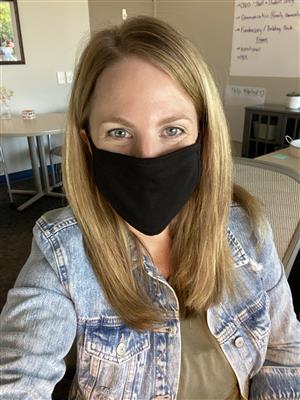Karen Rangler Takes the Helm at KRESA's Young Adult Program (YAP)

December 4, 2020
In July 2020, months into the COVID-19 pandemic, Karen Rangler was announced as the new principal of Kalamazoo RESA’s Young Adult Program (YAP) and would lead the school into the new school year. YAP is a center-based program that equips 18- to 26-year-olds with disabilities with the skills they need to lead successful lives after graduation, something its principal has been passionate about since she was a freshman in high school. It’s hard to imagine a better person for the job, especially given Rangler has been working at the school since 2012, first as a teacher, then as an instructional coach.
“I knew it would be tough, starting in the middle of a pandemic,” she said. “But I also knew first-hand that the team at YAP is incredible.” From the beginning, she has led with a staff-centric approach. As a former teacher, she knows to listen to her staff and give them an even greater voice. This helps with morale, but so do the spirit days, fun newsletters and celebrations Rangler has organized. More importantly, input from teachers, who now have experience leading classrooms in a pandemic, has proven invaluable for planning ahead.
For example, it was one thing to make sure the school had a reserve of desk sneeze guards, gowns and masks, but implementing a pandemic plan that works for staff, students and parents is another. Traditionally, the school’s students have done much of their learning either at school and in-person or at community worksites, options that may not be possible in a post-pandemic world. It took the input and cooperation of teachers, parents, maintenance workers and health officials to reopen in the fall.
After months of collaborative preparation, YAP instituted a hybrid learning model and welcomed students back to school in September. No one knew quite what to expect when the doors opened for the first day of school, but Rangler and her staff have been thrilled with what they have seen. Those learning from home, including the medically venerable, joined their in-person peers virtually. After only a few weeks, Rangler says students on screens were interacting in real-time with their classmates as naturally as if they were in the room.
“If anything, the students adapted faster than we have,” she said. “They’ve really thrived; it’s second-hand to them now.” In particular, Rangler is proud of her students for taking so well to mask-wearing and meeting virtually with classmates – skills that are becoming increasingly critical in a post-pandemic world.
“Even when we get to the other side of the pandemic, we’re going to hold on to this experience forever,” she said. “It’s corny, but these hard times have taught us a lot, clarified our purpose and unified us as a team. We’re not going to lose this feeling.”

